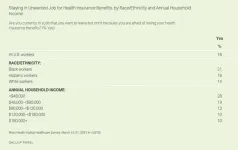(Press-News.org) WASHINGTON, DC - MAY 6, 2021 - One out of every six adult workers (16%) in the United States are staying in jobs they might otherwise leave out of fear of losing their employer-sponsored health insurance, according to a new West Health-Gallup survey of more than 3,800 U.S. adults.
The survey finds the fear is even more pronounced among Black workers, who are 50% more likely to remain in an unwanted job than their White and Hispanic counterparts (21% to 14% and 16%, respectively).
But the most likely to stay in a job they would rather leave are those workers in households earning less than $48,000 a year -- roughly 3 in 10 (28%) say they will not leave and risk losing their health benefits. Workers in lower income households are nearly three times more likely to stay in an unwanted job than are workers living in households earning at least $120,000 per year. According to a report by the Congressional Research Service, 37% of U.S. households earned less than $50,000 in 2019. Approximately 158 million people receive health insurance via their own employer or via the employer of a household member.
"Healthcare costs have become so high that many Americans are unwilling to risk any disruption in their coverage even if that means higher and higher premiums and deductibles and sticking with a job they may not like," said Tim Lash, chief strategy officer for West Health, a family of nonprofit and nonpartisan organizations dedicated to lowering healthcare costs to enable successful aging. "Americans are increasingly concerned that they will get priced out of the U.S. healthcare system and are struggling to hang on in any way they can."
Earlier this year, an estimated 46 million or 18% of the U.S. population reported that they could not afford healthcare if they needed it today. In this latest survey, three times as many Americans or approximately135 million adults, are worried that they will eventually be priced out of healthcare if they are not already.
Specifically, more than half of respondents report they are "concerned" or "very concerned" the cost of healthcare services (53%) and prescription drugs (52%) will become unaffordable. More Americans worry about rising healthcare costs even more than losing one's home (25%) or job (29%).
Black and Hispanic adults have modestly elevated concerns about the rising costs of healthcare compared to White adults. Two-fifths (42%) of respondents, in turn, report concern that they would not be able to pay for a major health event, including 49% of Hispanic adults and 47% of Black adults.
Majorities Support Select Government Action to Contain Cost of Care
Substantial concerns about the rising cost of care and medicine likely play a role in explaining why most respondents in the survey support the federal government taking a bigger role in lowering healthcare costs regardless of their political affiliation, racial background, or type of insurance.
About three-quarters favor setting limits on prescription drug price increases (77%), capping hospital prices in areas with few or no other hospitals (76%), and having the government negotiate lower prices for some high-cost drugs without lower-priced alternatives (74%).
Another 65% support placing government limits on prices for out-of-network care (65%). Those with private insurance were just as likely as those on public health plans including Medicare and Medicaid to favor government intervention.
"Polling data from West Health and Gallup continue to demonstrate that most Americans are supportive of an elevated government role in curtailing the rising costs of care," said Dan Witters, Gallup senior researcher. "How elected officials respond to this is unfolding, but there seems to be substantive public support for a number of specific proposals that are on the table."
This latest West Health-Gallup survey was conducted by web between March 15 and March 21, 2021 with 3,870 adults, ages 18+, living in all 50 U.S. states and the District of Columbia as part of the Gallup Panel. For results based on this sample of national adults, the margin of sampling error at the 95% confidence level is +2.2 percentage points for response percentages around 50% and is +1.3 percentage points for response percentages around 10% or 90%, design effect included. For reported sub-groups, the margin of error will be larger, typically ranging from ±3 to ±4 percentage points.
INFORMATION:
To read the full survey findings and methodology, please visit here.
About Gallup
Gallup delivers analytics and advice to help leaders and organizations solve their most pressing problems. Combining more than 80 years of experience with its global reach, Gallup knows more about the attitudes and behaviors of employees, customers, students and citizens than any other organization in the world.
About West Health
Solely funded by philanthropists Gary and Mary West, West Health is a family of nonprofit and nonpartisan organizations including the Gary and Mary West Foundation and Gary and Mary West Health Institute in San Diego, and the Gary and Mary West Health Policy Center in Washington, D.C. West Health is dedicated to lowering healthcare costs to enable seniors to successfully age in place with access to high-quality, affordable health and support services that preserve and protect their dignity, quality of life and independence. Learn more at westhealth.org and follow @westhealth.
Sophia Antipolis, 6 May 2021: One in four heart attack patients have atypical symptoms such as breathing difficulties, extreme exhaustion, and abdominal pain, according to a study published today in European Heart Journal - Acute Cardiovascular Care, a journal of the European Society of Cardiology (ESC).1 Patients with atypical symptoms were less likely to receive emergency help and more likely to die within 30 days compared to those with chest pain.
"We found that atypical symptoms were most common among older people, especially women, who called a non-emergency helpline for assistance," said study author Ms. Amalie Lykkemark Møller, PhD student, Nordsjællands Hospital, ...
A large study from Denmark and Norway published by The BMJ today sheds more light on the risk of rare blood clots in adults receiving their first dose of the Oxford-AstraZeneca covid-19 vaccine.
The findings show slightly increased rates of vein blood clots including clots in the veins of the brain, compared with expected rates in the general population. However, the researchers stress that the risk of such adverse events is considered low.
Cases of rare blood clots in people who have recently received their first dose of the Oxford-AstraZeneca covid-19 vaccine have been reported. Whether these cases represent excess events above expected ...
The new Danish-Norwegian study is the first study to document possible adverse events in relation to the COVID-19 vaccine Vaxzevria? from AstraZeneca, in which all vaccine recipients have been followed systematically, as opposed to previous studies, which have relied primarily on reported adverse reactions.
The new study was a cooperation between Danish and Norwegian research institutions.
- In this study, we were able to identify all hospital contacts among vaccinated persons by utilising the unique Danish and Norwegian health registers. This ensures that we get a comprehensive of the rate of adverse reactions. ...
Some clinicians are concerned that post-traumatic stress disorder (PTSD) diagnosis has risen throughout Western society since the late 1980s. Is this correct? And if so, has the true incidence of PTSD really spiralled out of control, or has it simply become overdiagnosed?
Experts debate the issue in The BMJ this week.
PTSD is a serious and uncommon condition resulting from severe trauma, but it has unhelpfully become an umbrella term incorporating other disorders and normal reactions to stress, argue John Tully at the University of Nottingham and Dinesh Bhugra at King's College London's Institute for Psychiatry, Psychology & Neuroscience (IoPPN).
Estimates of lifetime population prevalence are now about 7% in the US (26 million cases) and 5% in other high income countries. ...
Admission to an intensive care unit (ICU) is associated with a small increased risk of future suicide or self-harm after discharge compared with non-ICU hospital admissions, finds a study published in The BMJ today.
The findings are particularly relevant during the covid-19 pandemic, as the number of ICU admissions around the world reach all-time highs.
The findings show that survivors of critical illness who later died by suicide or had self-harm events tended to be younger with a history of psychiatric illness, and had received invasive life support.
The researchers stress that the overall risk is still very low, but say knowledge of these factors "might allow for earlier intervention to potentially reduce this important public health problem."
Survival after ...
Israel is the first country to report national data on the Pfizer-BioNTech vaccine, with observational analysis showing that two doses provide more than 95% protection against COVID-19 infection, hospitalisation, and death, including among the elderly, at a time when the B.1.1.7 variant was the dominant strain.
A single dose of the vaccine was associated with 58% protection against infection, 76% against hospitalisation, and 77% against death, emphasising the importance of fully vaccinating adults.
Challenges to controlling the pandemic remain, including uncertainty about ...
R21/Matrix-M becomes the second malaria vaccine candidate ever to start a phase III licensure trial
This builds on the recent finding of high level efficacy of this vaccine in a phase IIb trial in children in Burkina Faso, published today in The Lancet
The first phase III trial doses were administered by the team at the Malaria Research and Training Centre, Bamako, Mali, one of five trial sites across West and East Africa
The malaria vaccine was designed at the Jenner Institute, University of Oxford, who have partnered with the Serum Institute of India for commercial development
The annual death toll from ...
A new mutation found in a gene associated with an increased risk of atrial fibrillation poses a significantly increased risk for heart failure in Black people.
The discovery, made by researchers at the University of Illinois Chicago, could change current guidelines that recommend against genetic testing in people with atrial fibrillations, also known as AFib.
"We found that this new variant confers a significantly increased risk in African Americans, and this mutation has a 50% chance of being passed on to offspring," said Dr. Dawood Darbar, UIC professor of medicine and pharmacology at the College of Medicine. "Since it increases risk for heart failure, it would be wise to test people with atrial fibrillation to see if ...
According to a new study published in the journal Research in Social and Administrative Pharmacy, hospitals that participate in the 340B Drug Pricing Program provide more medication access services -- which are services that help remove barriers to accessing necessary medications -- than comparably sized non-340B hospitals.
The University of Illinois Chicago researchers who conducted the study, which included a survey of available services sent to a nationally representative sample of hospitals across the U.S., suggest that 340B participating hospitals may be better positioned to create and administer programs that support patients who are uninsured ...
Older people with kidney disease have a higher risk of dementia, and the risk increases with the rate and stage of kidney function decline. That is according to a large observational study by researchers at Karolinska Institutet in Sweden, published in the journal Neurology. The findings stress the significance of screening and monitoring for dementia in persons with kidney disease, the researchers say.
"Our study underscores the importance of low kidney function as a possible under-recognized risk factor for dementia," says co-author Juan Jesus Carrero, professor at the Department ...


